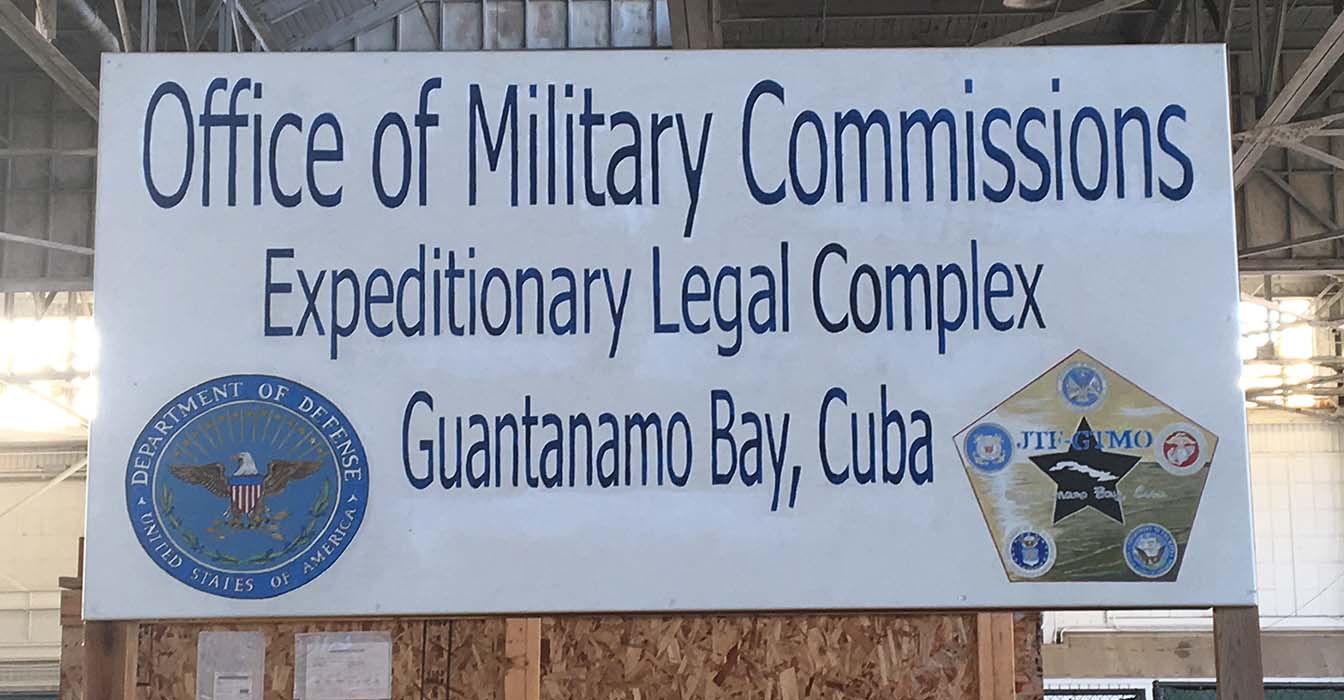Prosecutors in Sept.11 Case Deny Unconstitutional Censorship
By John Ryan | February 22, 2016 | News Articles, Guantanamo Bay, News & Features

Guantanamo Naval Base, Cuba – The chief prosecutor of the military commissions at Guantanamo Bay told the presiding judge on the Sept. 11 case that the government has the right to unilaterally redact court transcripts of proceedings that had been conducted entirely in public.
Army Brig. Gen Mark Martins acknowledged that doing so was “exceptional” and subject to “an appropriate level of scrutiny” reflected in the oral arguments that took up all of Monday morning. Seventeen media organizations as well as defense teams for all five defendants charged with the Sept. 11 attacks opposed the government’s redaction of testimony from pretrial hearings last fall.
Martins told the judge, Army Col. James Pohl, that the decision on what to release to the public rested with Executive Branch authorities responsible for determining what information could harm national security – not the judge.
“You are not an original classification authority,” Martins told Pohl.
David Schulz, a lawyer representing the media organizations, countered that the public had a “constitutional right of access” to the full transcript. The judge can consider the government’s concerns but has ultimate say over whether the redactions were appropriate, Shultz argued.
“Deference is not a rubber stamp,” he said.
David Nevin, the lead civilian lawyer for alleged plot mastermind Khalid Sheikh Mohammed, told Pohl that the openness of proceedings will play a role in how they are perceived around the world.
“Their legitimacy is in play at all times,” Nevin said.
Somewhat cryptically, Nevin also said that a secret order the defense received from the judge before pretrial hearings resumed last week – which he could not discuss in detail – would lead him to file motions seeking the recusal from the case of both Pohl and the prosecution.
Government Redacted Parts of Female Guard Testimony
At issue on Monday was the transcript of the Oct. 30, 2015, hearing in which senior camp guards testified on the impact of Pohl’s temporary ban on female guards touching the defendants on their way to court proceedings and legal meetings. (Pohl has not ruled whether to lift his ban.) The Oct. 30 hearing never moved into closed session; reporters and other observers watched the full proceedings at Guantanamo Bay and closed-circuit locations in the U.S. And publications, including Lawdragon, reported on what was said in proceedings that day.
Commission regulations require the publication of “unofficial, unauthenticated” transcripts of public proceedings on the court website, which are typically posted on the same day of proceedings or shortly after. However, the Oct. 30 transcript was posted a month later with a number of redactions of guard testimony on certain camp procedures and detainee complaints, among other topics.
Schulz, a prominent First Amendment attorney at New York’s Levine Sullivan Koch & Shulz, flew to Guantanamo Bay on Saturday to prepare for Monday’s hearings. Because presence inside Courtroom II at Camp Justice requires a top-security clearance, Schulz waited in the media gallery until it was his time to speak at the podium. (With the 40-second delay in the gallery to prevent the inadvertent release of classified information, Schulz was able to watch the very end of his presentation after he returned from addressing Pohl.)
Schulz argued that the government “waived its right” to redact any of the proceedings because they already had become the “public’s property” through the open session. He said the Military Commissions Act of 2009 and court rules prevent ex post redactions. He added that First Amendment case law would prohibit the redactions in this situation because the government failed to show a compelling reason and a narrowly-tailored approach to restricting access, citing the seminal Press Enterprise II (1986) U.S. Supreme Court case.
But Martins said that the public’s First Amendment right to access does not include access to information that the Executive Branch determines is harmful to national security.
Martins said that the “original classification authorities,” or OCAs, including the commander of Joint Task Force – Guantanamo, reviewed the transcript and determined that disseminating it on the website would be harmful. He citied an affidavit by the commander, Rear Admiral Peter Clarke, that stated posting the full transcript “would create a permanent and fixed asset that could be mined by” enemies of the U.S. and of his force.
Martins told the court that 18 percent of the Oct. 30 proceedings was redacted. After counsel for the media organizations objected, the government lifted some of the redactions so that the blacked-out testimony is now 6.2 percent of the contested transcript.
An important area of contention is whether the unofficial website transcripts constitute “judicial records.” Martins said that commission rules are clear that these transcripts are not judicial records but instead a means to facilitate public access to the case. Schulz disagreed, noting that the transcripts are used not only to inform the public but also by attorneys in preparing their motions.
Pohl did not rule on the media's motion Monday. This latest round of pretrial hearings began Feb. 16 and is scheduled to run through Friday. A trial date has not been set.

